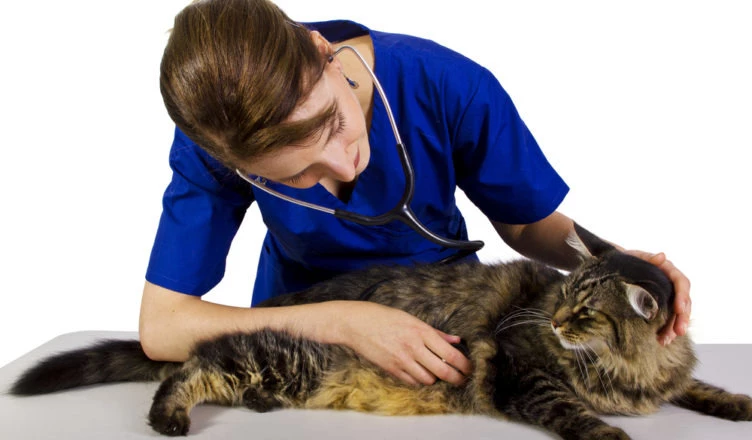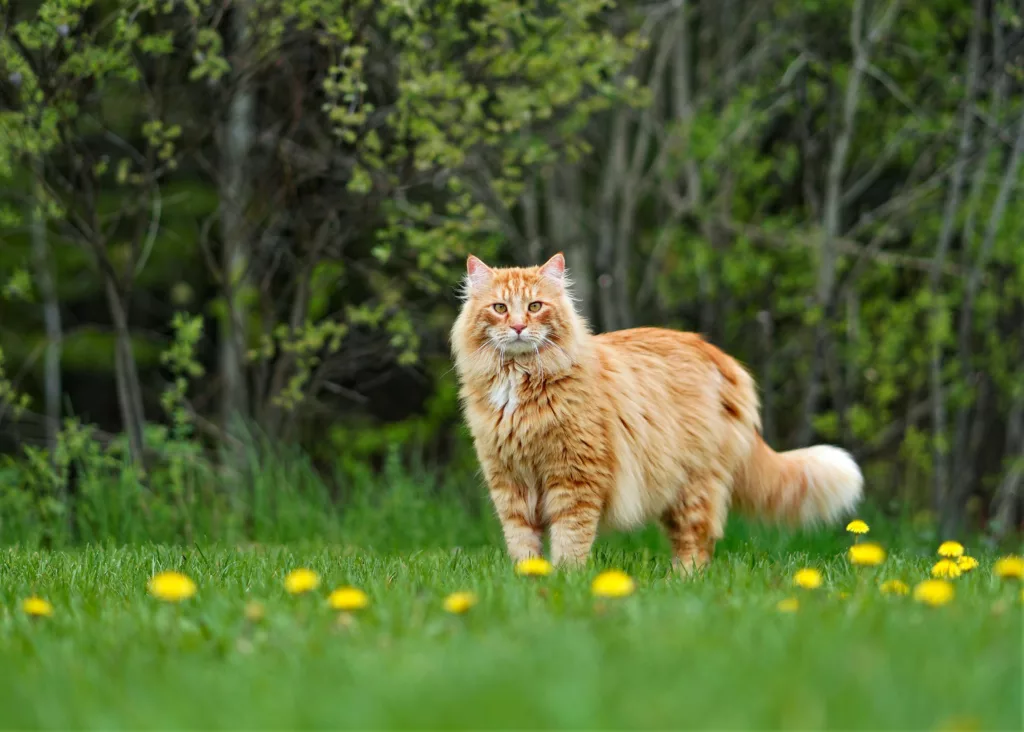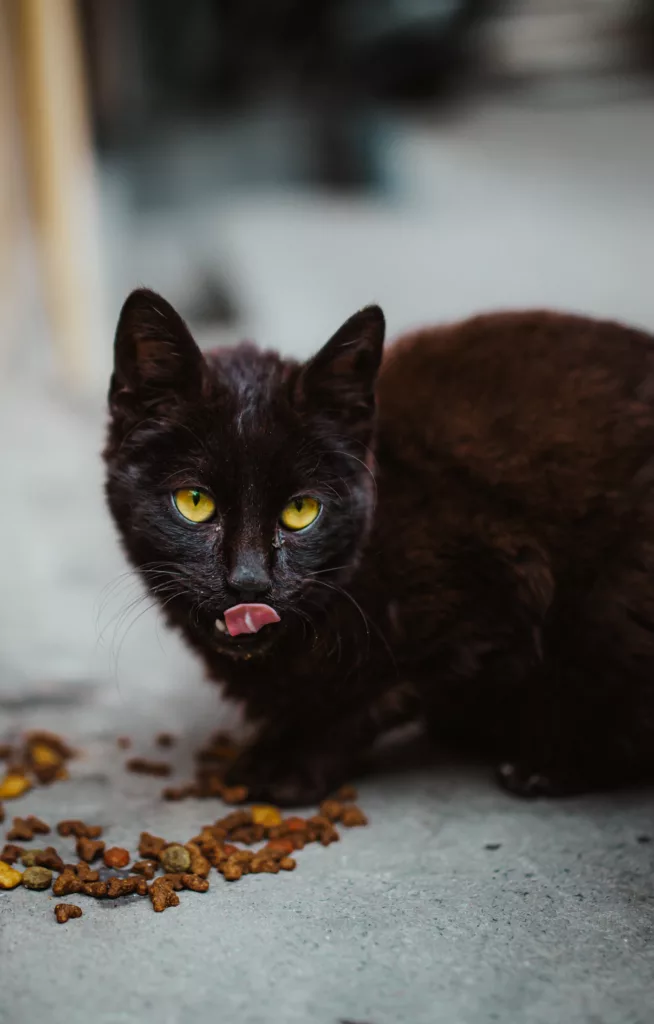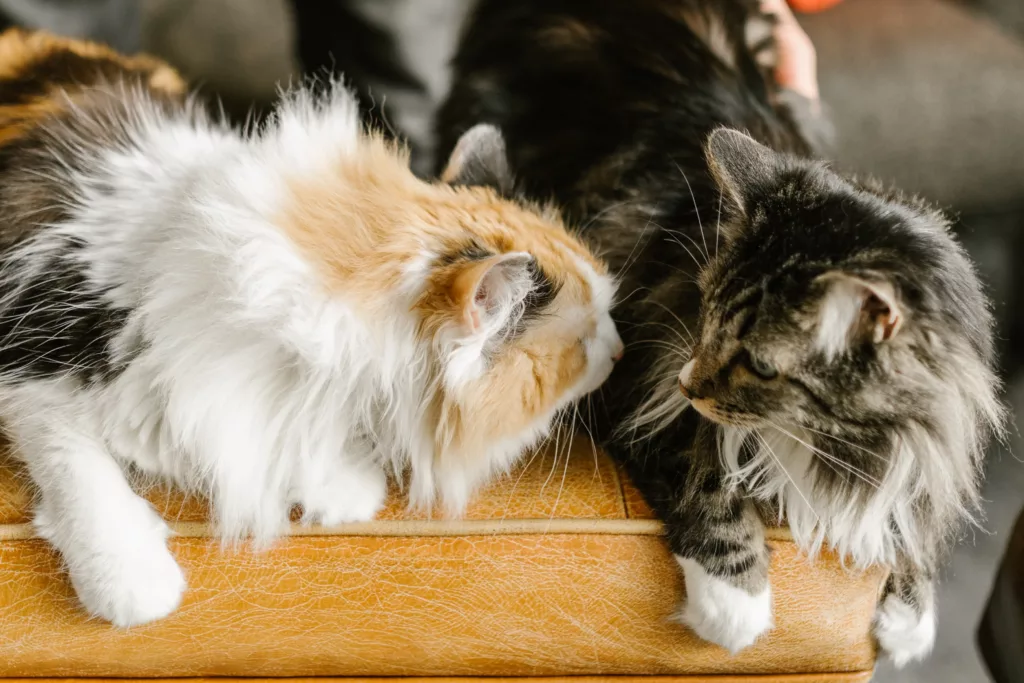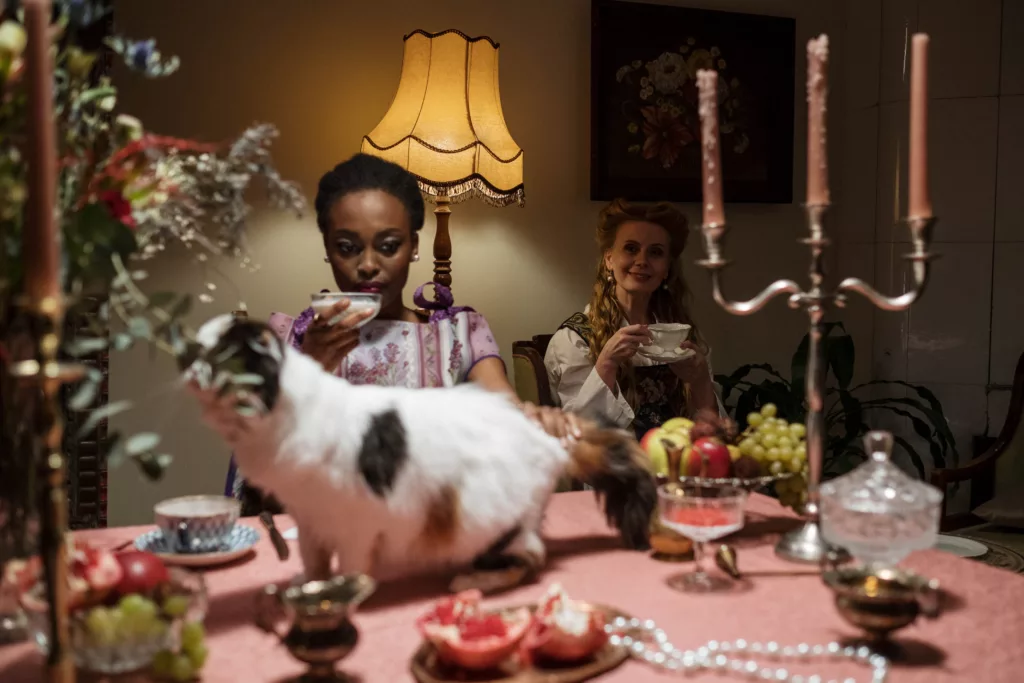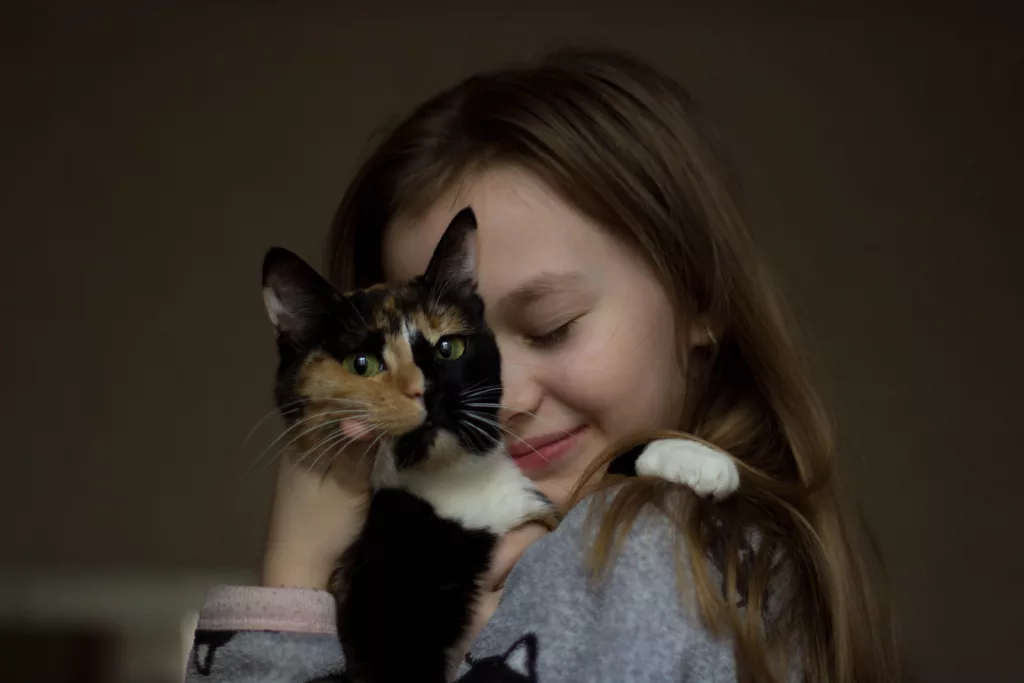Maine Coon Breeder’s Guide to Health
Let’s explore the fascinating world of Maine Coon breeder health.
These factors contribute to the happy and healthy lifestyle of these playful giants adorned in their plush coats.
1. A Genetic Strategy for Success
According to UCDAVIS veterinary genetics laboratory of America Cats affected by hypertrophic cardiomyopathy (HCM) are at risk of sudden cardiac death.
In Maine Coon cats with two copies of the disease-associated mutation, moderate to severe cardiac disease can lead to sudden death by age 4 years or less.
Maine Coon cats are disposed to certain genetic conditions like Hypertrophic Cardiomyopathy (HCM) and Spinal Muscular Atrophy (SMA). Responsible breeders can test for these conditions to guarantee the healthiest kittens possible.
Testing breeding cats for these genetic issues can help breeders make informed decisions and restrict breeding cats that may pass these conditions onto their offspring.
To safeguard the wellness of their pet companions, breeders prioritize genetic testing, regular vet visits, nutritious meals, ethical values, and a supportive community.
Hypertrophic Cardiomyopathy (HCM) Testing’s Essential Function
The importance of HCM testing and how it affects breeding choices, especially with regard to the MYBPC mutation.
MyBPC3: This mutation is associated with an increased risk of developing HCM in this breed.
Early Identification: Because HCM rises silently, a cat might not show any signs until the condition becomes worse. Continuous testing enables early diagnosis, even in the absence of clinical symptoms.
Therapy choices: If HCM is caught early, there may be a greater variety of management and therapy choices.
Although there is no known treatment for HCM, early intervention can aid with symptom management and may even reduce the disease’s development.
Breeding Choices: Naturally in species like the Maine Coon, HCM has a hereditary component that might influence breeding decisions. Breeders can make educated choices about which cats to breed thanks to testing.
Breeders can lower the frequency of the illness in next generations by refusing from breeding cats with HCM.
Testing price: An HCM testing price of Maine coons can range between $30 to $120, depending on the testing location and the provider.
2. Regular Vet Visits
Early noticing of health problems, especially heart-related, is important in Maine Coons. Regular check-ups and screenings for HCM can make all the difference. Discover the importance of veterinary heart screenings.
- Regular check-ups enable the early detection of possible health issues, ensuring that they are quickly handled.
- Prevention is key in a breeding setting where illnesses may spread quickly, and this includes vaccinations, deworming, and parasite management for cats.
- Veterinarians can examine the reproductive fitness of Maine Coons to make sure they are clear of illnesses or congenital conditions that could damage kittens.
- Vets may help breeders choose healthy breeding couples and lower the risk of genetic diseases like HCM by offering insights into potential genetic issues.
- Breeders can guarantee Maine Coons receive the correct nutrients in the optimum proportions with their help, boosting healthy growth and lowering the risk of obesity.
Ultrasounds of the heart is seen as the best way to remove the threat of HCM from the Maine Coon breed.
X- rays that were submitted to the Orthopedic Foundation for Animals (OFA) indicate that 24.1% of Maine Coons suffered some level of hip dysplasia although the severity and symptoms were not recorded.
3. Nutrition
Maine Coons have especial dietary needs that must be met for perfect health.
High-quality protein :
It is crucial for maintaining healthy muscles and organs. Look for meals where the first component is a high-quality source of animal protein, such as chicken, turkey, fish, or lamb.
FATS: Healthy fats serve as a key energy source and a supply of vital fatty acids.
Omega-3 fatty acids, which are good for the health of the skin and coat, may be obtained from sources like fish oil.
Fiber: Aids in digestion and aids in preventing hairballs, which are a problem for breeds with long hair, such as Maine Coons.
Moisture Content: Cats don’t get enough water to drink. The moisture that is required to promote kidney and urinary tract health can be provided by wet meals.
Avoid Artificial Additives and Fillers: The lack of useless fillers like grain, wheat, and soybeans, which have little nutritional value, is a sign of high-quality cat food.
Avoid foods that include artificial flavors, colors, and chemicals.
Consideration for Life Stages:
Adults, older, and kittens all require various types of nourishment. Make sure the food is suitable for the Maine Coon’s stage of development.
4. Ethical Breeding
From the breeding age to socialization, responsible Maine Coon breeding is about more than just their stunning appearance.
Health screening: Before mating, make sure that the male and female have both been examined for common hereditary diseases in Maine Coons, including as hip dysplasia and hypertrophic cardiomyopathy (HCM).
Age: Only Maine Coons who have fully matured, usually after 18 months of age, should be bred. A female should only be bred a certain number of times during her lifespan.
Breeding Environment: Cats should not be kept in cages or other confined locations, but rather in a household environment. This encourages social interaction and improved general health.
Reduce Litters: The queen’s health may suffer from overbreeding, and the kittens may receive less care. The amount of litters a female can have in her lifespan is restricted by ethical breeders.
5. The Maine Coon Community
In my experience its very important for breeders, especially those new to the business, it might be helpful to join a respectable community or breed group.
Here is how such a group may assist in breeding:
Education:
Numerous breed groups provide seminars, workshops, and instructional resources on the best breeding techniques, health problems unique to the Maine Coon, and developments in feline medicine.
Learn how joining Maine Coon breed-specific clubs can benefit both breeders and cats.
Networking:
Breeders have access to a network of seasoned persons when they are a part of a community. This might be essential for locating trustworthy breeding mates, exchanging lineage details, or even receiving guidance on how to deal with certain difficulties.
Mentorship:
Younger breeders can gain knowledge from more experienced breeders. There are several neighborhoods with mentoring programs where newcomers may learn.
Genetic counseling:
To promote healthy offspring and avoid infertility breeders might receive advice on ancestors and genetics from senior members.
Access to Resources:
Breed clubs frequently have libraries or databases with relevant literature on breeding and health-related topics.
Opportunities for cat shows:
A lot of breed communities sponsor or collaborate on cat events. Breeders may use these events as a forum to display their cats, get comments, and build their reputations.
In short, becoming a member of a Maine Coon community may give breeders the instruments, resources, and social network they require to conduct effective, ethical, and responsible breeding.
It guarantees that breeders are not operating independently but rather as a unit that places a high priority on the health, welfare, and future of the Maine Coon breed.
6. Collaboration with Veterinarians
Working together with veterinarians is essential in Maine Coon breeding to provide maximum health and genetic strength.
Veterinarians aid during pregnancy and labor problems, give assistance on nutrition and preventative care, do vital health exams for illnesses like hypertrophic cardiomyopathy (HCM), and offer genetic and hereditary advice.
Additionally, their knowledge of newborn care, recommended vaccinations, and emergency treatments is priceless.
In addition to raising breeding standards, our partnership gives potential clients peace of mind by ensuring them that the cats are receiving the best possible care and well-being.
7. Education for New Owners
The welfare and lifespan of Maine Coon breeders depend on educating new owners. But how? lets explain.
What I know is that educating new owners are better equipped to provide preventative care, adhere to suitable dietary guidelines, exercise and trainings and recognize early signs of inherited illnesses like HCM.
This knowledge promotes ethical breeding techniques and encourages commitment to regular veterinarian visits. Furthermore, competent owners may create habitats that are safer and better suited to Maine Coons’ needs, thus reducing health risks.
The breed’s quality of life is ultimately ensured by an educated owner base, which adds to a good attitude.
8. Breeding Age Considerations
One of the key factors for breeding of Maine coon is the consideration of age, which affects both the cats’ health and wellbeing and those of their young.
Between the ages of 18 and 24 months, when they reach full maturity, Maine Coons are usually best bred. Starting earlier could affect the queen’s body, endangering her health and increasing the likelihood of complications with pregnancy and delivery.
On the other hand, because the risks associated with pregnancy and birthing may increase with age, breeders must take caution when choosing older cats.
A cat’s breeding life should also include routine health checks, especially for genetic conditions like HCM.
| MALE(TOMS) | FEMALE (QUEENS) |
| While male Maine Coons can become fertile by 6-8 months of age, it’s advisable to wait until they’re a bit older and more mature, around 18 months, before using them for breeding. | It’s generally recommended to wait until a female Maine Coon is at least 18 months old before she has her first litter. This gives her body enough time to mature properly so she can safely carry and care for her kittens. |
9. Proper Socialization and Care:
Introducing Maine Coons to various peoples, pets, and environments at a young age to ensure confident and friendly behavior.
Maine Coon breeders need to be carefully looked after and socialized in order to maintain their health.
These gentle giants, known for their friendly demeanors and alluring presence, require early and regular exposure to a variety of environments, people, and animals.
This ensures simpler mating processes and pleasant maternal behaviors in addition to encouraging emotional development and endurance.
In addition to being socialized, dedicated care, which includes regular veterinarian appointments, grooming, and a nutritious diet, ensures that the Maine Coon remains in great shape, both for breeding and for having a happy life.
Anyone participating in the world of Maine Coons can determine the difference between a successful breeding environment and one full of challenges by understanding them and putting these techniques into practice.
Emotional Bonding and Training:
Maine Coons are devoted cats who form strong bonds with their family members.
Among the species, the female enjoys intimate relationships with every member of the family, whereas the male prefers to have only one owner who provides food for them. The growth and comfort of Maine Coons are significantly influenced by emotional attachment and training. These majestic cats, who stand tall and have a kind disposition, create strong bonds with their human friends.
Creating an emotional connection not only promotes trust but also improves training efforts. Maine Coons are more attentive to signals and instructions, which facilitates activities like litter training, leash walking, and even trick mastery.
It also enhances the loving qualities of the Maine Coon, making it more than simply a pet but a beloved member of the family.
The quality of life for both the cat and its owner is improved by this relationship when used in conjunction with regular and constructive training techniques.
Conclusion:
Maine Coon cats are majestic, and their breeding demands our utmost attention and love.
By focusing on genetic testing, regular veterinary care, proper nutrition, moral practices, and community help, breeders can ensure that their furry family members live healthy and fulfilling lives.
Because of a mix of dedicated care, informed breeding practices, and ongoing devotion to their welfare, these gentle giants have a bright future ahead of them.
Breeders care more about the sound of a heart that beats well than merely the heritage of a bloodline. The Maine Coon, whose perfect breeding and care are mirrored in every meow, deserves praise.
Want to Know More About Maine Coon Health?
Considering a Maine Coon as your next family member or looking to breed these gentle giants?
How will you ensure their health and happiness? Feel free to share your thoughts or ask any question about the majestic Maine Coon!
